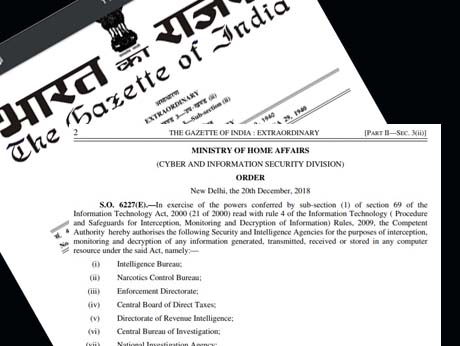
New Delhi December 22 2018: The Indian Ministry of Home Affairs has issued an order that gives sweeping powers to 10 security and intelligence agencies to intercept, monitor and decrypt "any information generated, transmitted, received or stored in any computer resource" as defined in the Information Technology Act of 2000.
The definition of 'computer resource' in the IT Act is wide enough to include not just computers, laptops and tablets, but also smartphones and smartwatches.
The ten agencies so empowered are: (i) Intelligence Bureau; (ii) Narcotics Control Bureau; (iii) Enforcement Directorate; (iv) Central Board of Direct Taxes; (v) Directorate of Revenue Intelligence; (vi) Central Bureau of Investigation; (vii) National Investigation Agency; (viii) Cabinet Secretariat (RAW); (ix) Directorate of Signal Intelligence (For service areas of Jammu & Kashmir, North-East and Assam only); (x) Commissioner of Police, Delhi.|
The order dated December 20 is issued against the powers conferred by subsection 1 of section 69 of the IT Act. Section 69 of the IT Act deals with the “power to issue directions for interception or monitoring or decryption of any information through any computer resource”. According to an earlier order, the Union home secretary is also empowered to authorise or sanction the intelligence and security agencies for undertaking tapping and analysis of phone calls under the provisions of the Indian Telegraph Act.
Opposition parties were swift to condemn the new order as Orwellian. Cyber law specialist , Pawan Duggal has said that apart from listing the names of the central agencies empowered to carry out such surveillance, nothing else has been added to Section 69 of the IT Act.
But others have pointed out that since the Act was passed, the Supreme Court has now recognised the right to privacy as a fundamental right which flows from Article 21 of the Constitution. Instead of amending Section 69 to strengthen privacy in the light of the apex court judgment, government seems to have veered in the opposite direction, essentially thumbing its nose at any privacy concerns.
A day after public furore broke out, the Home Ministry issued a release to say:
"No new powers have been conferred to any of the security or law enforcement agencies by the S.O. dated 20.12.2018.... Each case of interception, monitoring, decryption is to be approved by the competent authority i.e. Union Home secretary. These powers are also available to the competent authority in the State governments.."
There is some surprise at the timing of the new order and its effect of formalising such surveillance and commentators on TV channels are asking what the precise trigger was.
Read the full government order here